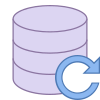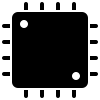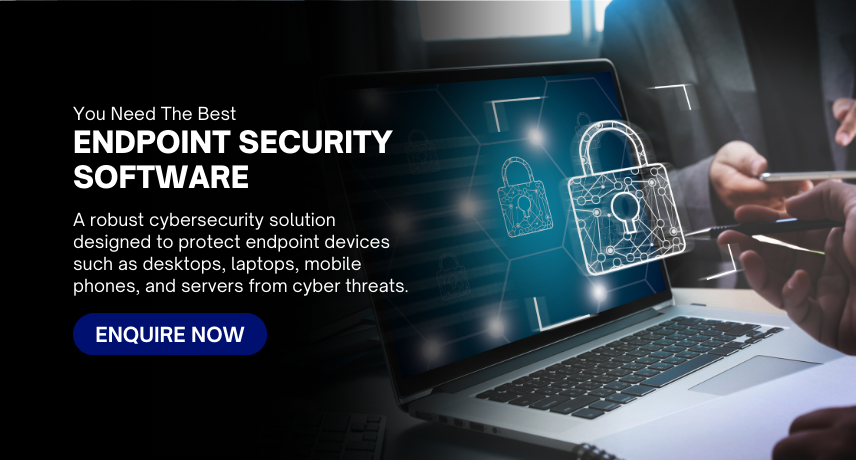Enquiry Form
What is Endpoint Security Software?
Endpoint Security Software is a robust cybersecurity solution designed to protect endpoint devices such as desktops, laptops, mobile phones, and servers from cyber threats. By offering features like antivirus protection, firewall management, threat detection, and encryption, this software ensures that all endpoint devices within an organization are secure. It plays a critical role in safeguarding sensitive data, preventing breaches, and maintaining compliance with regulatory standards, making it indispensable for businesses of all sizes.
Best Features of Endpoint Security Software
Here are 15 key features of Endpoint Security Software that make it vital for modern organizations:

Antivirus and Malware Protection:
Detect and block malicious software in real-time.

Threat Detection and Response:
Identify and neutralize potential threats before they can cause damage.

Firewall Management:
Monitor and control incoming and outgoing network traffic on endpoints.

Endpoint Encryption:
Protect sensitive data on devices with robust encryption protocols.

Device Control:
Restrict the use of unauthorized devices like USB drives to prevent data theft.

Patch Management:
Automate the application of software updates to close security vulnerabilities.

Behavioral Analysis:
Monitor user and device behavior to detect anomalies and suspicious activities.

Multi-Factor Authentication (MFA):
Add an additional layer of security to endpoint access.

Cloud-Based Management:
Manage endpoint security remotely via cloud-based dashboards.

Intrusion Prevention System (IPS):
Proactively block unauthorized access attempts to endpoints.

Threat Intelligence Integration:
Leverage real-time threat intelligence to stay ahead of emerging risks.

Application Control:
Allow only approved applications to run on endpoint devices.

Data Loss Prevention (DLP):
Prevent unauthorized access or sharing of sensitive data from endpoints.

Ransomware Protection:
Detect and block ransomware attacks before they encrypt critical data.

Compliance Reporting:
Generate reports to demonstrate adherence to regulatory standards.
Benefits of Endpoint Security Software
Endpoint Security Software offers significant advantages for businesses and organizations:
- Comprehensive Device Protection: Safeguard all endpoint devices against malware, ransomware, and unauthorized access.
- Centralized Management: Manage security policies and monitor threats across all devices from a single platform.
- Reduced Cybersecurity Risks: Minimize vulnerabilities by detecting and addressing threats in real-time.
- Enhanced Data Security: Protect sensitive information with encryption and data loss prevention features.
- Regulatory Compliance: Ensure adherence to industry standards and avoid penalties for non-compliance.
- Improved Productivity: Reduce downtime caused by cyberattacks and ensure uninterrupted operations.
- Scalable Solutions: Adapt security measures to the size and needs of the organization.
- Cost Efficiency: Lower costs associated with data breaches and IT support for endpoint security.
Which Businesses Need Endpoint Security Software?

SMEs use Endpoint Security Software to protect their limited IT infrastructure from cyber threats.
- Real-Time Threat Detection: Identify and block malware, phishing, and ransomware attacks.
- Cost-Effective Protection: Access affordable solutions tailored for small business needs.
- Remote Device Management: Secure endpoints for employees working remotely.
- Data Encryption: Safeguard sensitive customer and financial data.
- Patch Management: Ensure all software on endpoint devices is up to date.
- Compliance Adherence: Meet regulatory requirements without the need for extensive IT resources.

Large organizations use Endpoint Security Software to secure a vast number of devices and complex networks.
- Centralized Security Management: Monitor and manage endpoint security across multiple locations.
- Behavioral Analytics: Detect anomalies in user behavior to prevent insider threats.
- Advanced Threat Intelligence: Stay ahead of sophisticated cyberattacks with real-time threat insights.
- Integration with Enterprise Tools: Sync endpoint security with existing IT management and monitoring systems.
- Scalability: Secure a growing number of devices as the organization expands.
- Compliance Reporting: Generate detailed reports to demonstrate regulatory adherence.

Healthcare providers rely on Endpoint Security Software to secure patient data and comply with industry regulations.
- HIPAA Compliance: Protect electronic health records (EHR) and patient information.
- Data Encryption: Secure sensitive medical data on endpoints and during transmission.
- Ransomware Protection: Prevent ransomware attacks that can compromise patient care.
- Access Control: Restrict access to medical data to authorized personnel only.
- Real-Time Monitoring: Detect and respond to threats targeting healthcare systems.
- Incident Reporting: Log security events for compliance and audits.

Banks and financial organizations use Endpoint Security Software to secure sensitive financial data.
- Fraud Prevention: Protect endpoints from malware targeting financial transactions.
- Secure Remote Access: Enable secure remote work for financial professionals.
- Compliance Assurance: Ensure adherence to financial regulations like PCI DSS.
- Endpoint Encryption: Encrypt customer and transaction data to prevent breaches.
- Threat Intelligence: Leverage AI-powered tools to detect emerging financial threats.
- Audit Trails: Maintain logs of endpoint security events for regulatory purposes.

Schools and universities use Endpoint Security Software to secure their networks and protect student and staff data.
- Device Protection: Secure endpoints like laptops and tablets used by students and staff.
- Data Privacy Compliance: Ensure adherence to regulations like FERPA for student data protection.
- Ransomware Defense: Prevent attacks targeting academic and administrative systems.
- Access Control: Restrict access to sensitive academic and financial records.
- Real-Time Monitoring: Track and respond to suspicious activities on campus networks.
- Cloud Security Integration: Protect data stored on cloud-based e-learning platforms.
How Endpoint Security Software Works
Endpoint Security Software employs a layered approach to protect devices:

- Installation and Deployment: Deploy security agents on all endpoint devices within the network.
- Threat Detection: Monitor device activity and scan for malicious software or unusual behavior.
- Real-Time Protection: Block cyber threats like malware, ransomware, and phishing attacks as they occur.
- Access Control: Implement multi-factor authentication and role-based permissions for endpoint users.
- Patch Management: Identify and update outdated software to eliminate vulnerabilities.
- Data Encryption: Encrypt sensitive data stored on or transmitted from endpoint devices. Compliance Monitoring:
- Compliance Monitoring: Track endpoint security practices to ensure they meet regulatory requirements.
- Reporting and Alerts: Provide real-time alerts for threats and generate detailed security reports for analysis.
This workflow ensures endpoints remain secure and contribute to a safer organizational network.
Endpoint Security Software FAQs
Frequently Asked Questions about Endpoint Security Software



